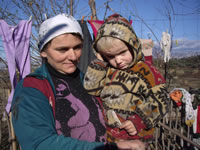 It is February when we are driving from Rinas, Tirana’s airport, to the north; the road is in a reasonable state. It has been worked on for years and there now is a good connection to the city of Shkoder, Albania’s third city. There is a lot to see on both sides of the road: automobile graveyards of over 200 metres in length, ruins or half finished houses and especially restaurants in a permanent state of building for years already now, erected haphazardly. Then there is also the abundant litter, plastic in particular, this country’s biggest problem.There are also many people at the roadside, waiting or hanging around, maybe waiting for the good news: work.
It is February when we are driving from Rinas, Tirana’s airport, to the north; the road is in a reasonable state. It has been worked on for years and there now is a good connection to the city of Shkoder, Albania’s third city. There is a lot to see on both sides of the road: automobile graveyards of over 200 metres in length, ruins or half finished houses and especially restaurants in a permanent state of building for years already now, erected haphazardly. Then there is also the abundant litter, plastic in particular, this country’s biggest problem.There are also many people at the roadside, waiting or hanging around, maybe waiting for the good news: work.
A lot has happened in this country in recent years. Particularly since the Democrats have come to power and have been governing the country, a lot of work has been done to improve roads and provide a better infrastructure, but it will take many years for Albania to make good on the backlog.
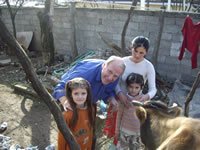 The nature is beautiful: 75% of the country consists of mountains with the occasional summit higher than 2000 metres, and this area is rough and uncultivated. Then there is also the coastline with beautiful sandy beaches along the Adriatic. Unfortunately, the public litter heaps can also be found here.
The nature is beautiful: 75% of the country consists of mountains with the occasional summit higher than 2000 metres, and this area is rough and uncultivated. Then there is also the coastline with beautiful sandy beaches along the Adriatic. Unfortunately, the public litter heaps can also be found here.
The traditionally very poor city of Shkoder is visibly recovering. More and more streets are being paved and several flat buildings which up until now were very grey and poorly maintained, are now being repainted in fresh colours. Located near the road into the city on the other side of the river Buna is the Roma slum quarter. Here nothing has improved yet, including the wooden very narrow bridge connecting the city with the area.
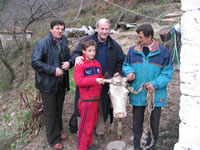 Services to help children
Services to help children
It is in this isolated region that the Vereniging voor Jeugd- en Kinderzorg (Association for Youth and Child Care) is working. This Association from the city of Zwolle in the Netherlands has been in existence for a century already, and it has been engaged in projects in Albania for years now.
One example is the donation of pregnant cows to the very poor families in the mountains, who often have handicapped children. For these families, who have to live off €25 per month, it is the most important means of providing for themselves. These families can have a better future with milk, butter and cheese. The calf that is eventually born is supposed to be donated to a family living under similar circumstances.
The condition of many handicapped children is a matter of extreme concern. In many cases there are no medical services available to them whatsoever.
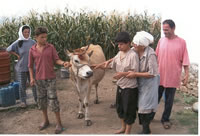 The unemployment rate among youngsters is more than 60%. Many try to find a better future abroad. With the highly motivated and skilled staff at the Permakultura Resource Centre, affiliated with Oxfam, we are trying to get youngsters employed by means of offering training and pilot projects in agriculture and horticulture, thus binding them to their native country.
The unemployment rate among youngsters is more than 60%. Many try to find a better future abroad. With the highly motivated and skilled staff at the Permakultura Resource Centre, affiliated with Oxfam, we are trying to get youngsters employed by means of offering training and pilot projects in agriculture and horticulture, thus binding them to their native country.
Horticulture in Albania is managed on an almost 100% organic basis. This can serve as an example to other countries. The quality of products in the Mediterranean climate is extremely good. Selling these products, however, often is a tough hurdle to tackle, as many countries are closing their borders for these products.
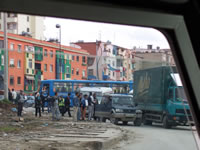 Supporting child care workers
Supporting child care workers
There is still much room for improvement in youth care in Albania. There are big government institutions but also private children’s homes with Italian support. Although there is a demand for foreign expertise, there are not many contacts between the existing children’s services within the country. FICE-International is intending to try to develop a youth care network in the near future, and it is hoped that it will be possible to make connections with existing FICE networks in South East Europe, overcoming an isolation which has existed for years.
There is still a lot of work to do in Albania, a country full of challenges!
Anton Tobé is Vice President of FICE-International, with responsibility for liaison with South East Europe.
